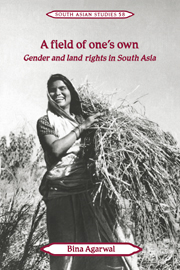Book contents
- Frontmatter
- Contents
- List of illustrations
- List of tables
- Preface
- Map 1.1 South Asia: provincial/state divisions
- 1 Land rights for women: making the case
- 2 Conceptualizing gender relations
- 3 Customary rights and associated practices
- 4 Erosion and disinheritance: traditionally matrilineal and bilateral communities
- 5 Contemporary laws: contestation and content
- 6 Whose share? Who claims? The gap between law and practice
- 7 Whose land? Who commands? The gap between ownership and control
- 8 Tracing cross-regional diversities
- 9 Struggles over resources, struggles over meanings
- 10 The long march ahead
- Definitions
- Glossary
- References
- Index
- Cambridge South Asian Studies
9 - Struggles over resources, struggles over meanings
Published online by Cambridge University Press: 14 January 2010
- Frontmatter
- Contents
- List of illustrations
- List of tables
- Preface
- Map 1.1 South Asia: provincial/state divisions
- 1 Land rights for women: making the case
- 2 Conceptualizing gender relations
- 3 Customary rights and associated practices
- 4 Erosion and disinheritance: traditionally matrilineal and bilateral communities
- 5 Contemporary laws: contestation and content
- 6 Whose share? Who claims? The gap between law and practice
- 7 Whose land? Who commands? The gap between ownership and control
- 8 Tracing cross-regional diversities
- 9 Struggles over resources, struggles over meanings
- 10 The long march ahead
- Definitions
- Glossary
- References
- Index
- Cambridge South Asian Studies
Summary
I take the politics of needs to comprise three moments that are analytically distinct but interrelated in practice. The first is the struggle to establish or deny the political status of a given need, the struggle to validate the need as a matter of legitimate political concern or to enclave it as a nonpolitical matter. The second is the struggle over the interpretation of the need, the struggle for the power to define it and, so, to determine what would satisfy it. The third moment is the struggle over the satisfaction of the need, the struggle to secure or withhold provision.
(Fraser 1989: 164)In South Asia today, struggles of all three sorts are necessary in relation to women and land: to establish women's need for rights in land; to define the parameters of that need; and to translate that need into actual rights in practice. We noted in chapter 2 that a critical factor in women's ability to bargain for a share in arable land is social acceptance of the legitimacy of the claim. In many parts of the subcontinent, recognition of women's need for rights in land has itself to be struggled for. The depth of opposition even to the idea has been noted throughout our discussion, in the contestation over the Hindu Code Bill, in the responses of patrilineal communities when gender-progressive property laws were passed, and in the formulation and implementation of government policy. At the same time, I have argued that perceptions about needs are not given but contested, and are constantly in the process of reformulation.
- Type
- Chapter
- Information
- A Field of One's OwnGender and Land Rights in South Asia, pp. 421 - 466Publisher: Cambridge University PressPrint publication year: 1995

